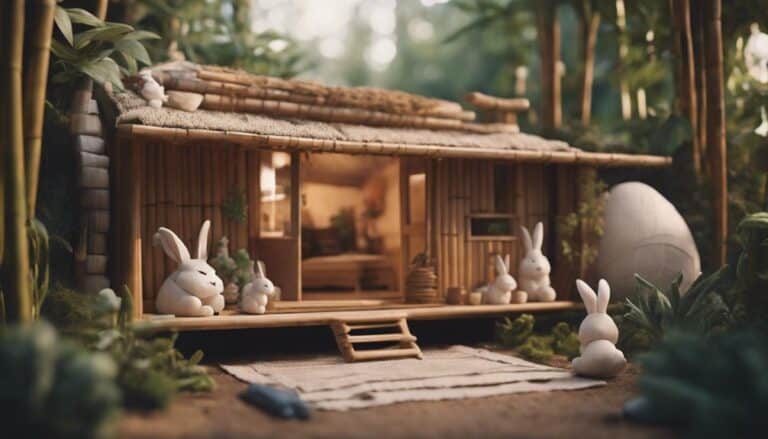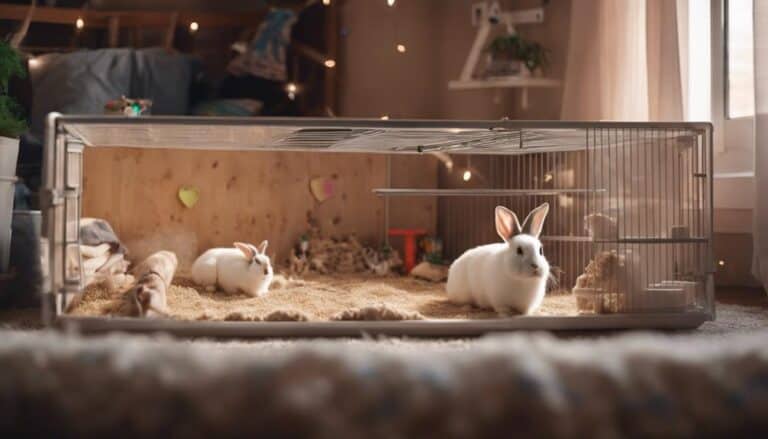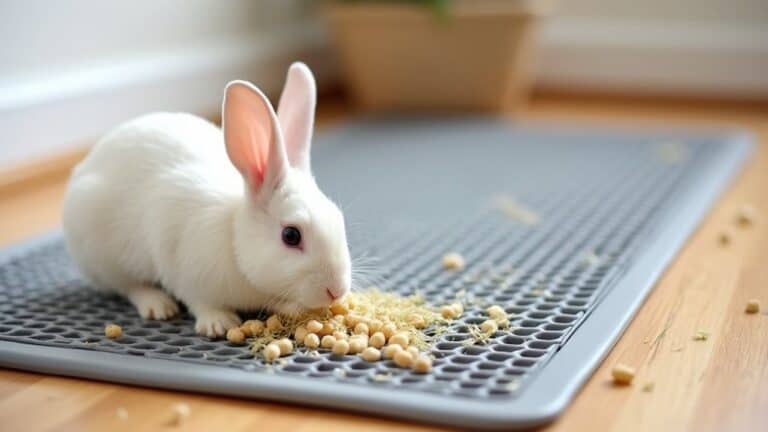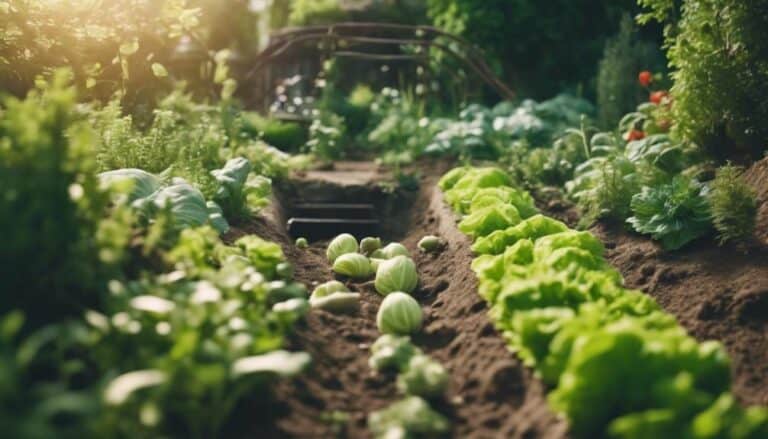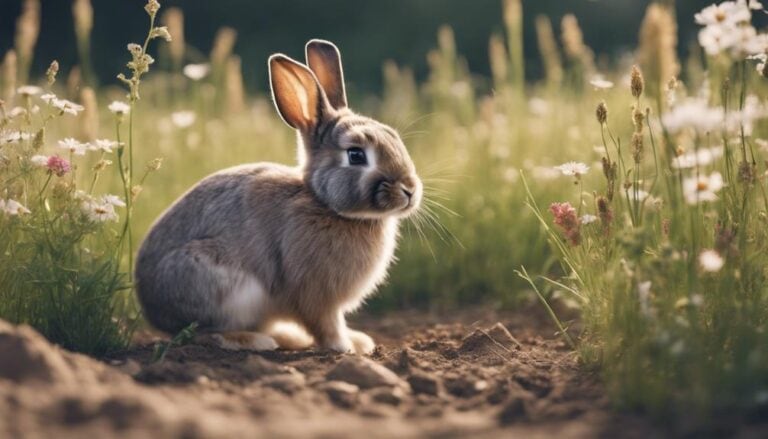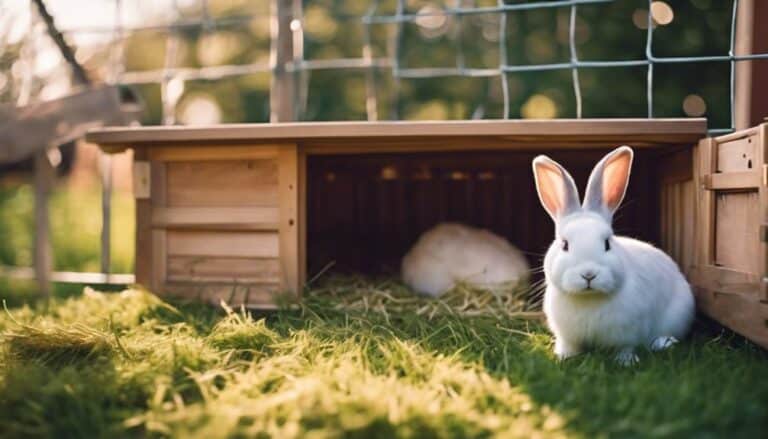If you're looking to create a thriving habitat for your bunnies, selecting the right plants is key. Imagine adding vibrant colors and fresh scents to their environment while ensuring their dietary needs are met.
The right plant choices can not only enhance their surroundings but also contribute to their overall health and happiness. Let's explore further how you can curate a bunny-friendly garden that will benefit both you and your furry companions.
Contents
Key Takeaways
- Bunny-friendly herb plants like oregano and mint offer antioxidants and minerals for bunnies.
- Leafy greens such as Swiss chard and kale provide essential vitamins and minerals for a balanced bunny diet.
- Colorful flowers like sunflowers and marigolds can enrich a bunny's environment with vibrant hues.
- Safe plants like roses and daisies not only beautify but also offer health benefits for bunnies in their habitat.
Bunny-Friendly Herb Plants
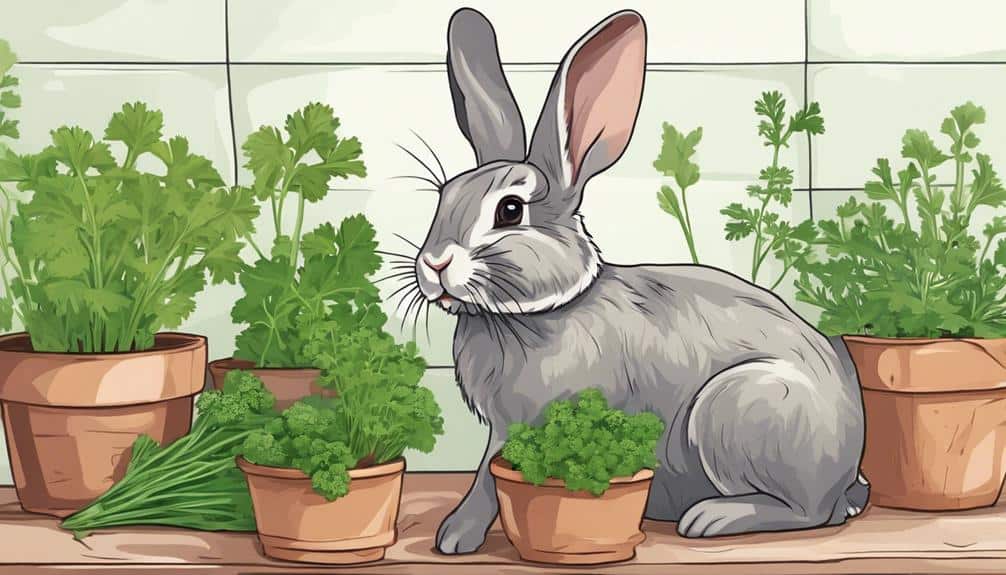
When creating a habitat for bunnies, incorporating bunny-friendly herb plants such as oregano, mint, parsley, chives, and dill weed can provide essential nutrients and flavors for their well-being.
Oregano, rich in antioxidants, iron, and calcium, is a versatile herb suitable for indoor, outdoor, or container growth.
Mint, offering vitamins and minerals like calcium, magnesium, and potassium, benefits digestion and oral health, making it a valuable addition to a bunny garden.
Parsley, packed with vitamin C, iron, calcium, vitamins A, K, B6, and fiber, aids in digestive regulation, promoting overall health in rabbits.
Chives, with their mild onion flavor, aren't only versatile in various dishes but also safe for bunnies to consume, either fresh or dried.
Dill weed, known for its strong flavor, matures quickly and adds a unique taste to salads, enriching the sensory experience for rabbits in their garden habitat.
Incorporating these bunny-friendly herb plants ensures a safe and nutritious environment for your rabbit companions.
Leafy Greens for Bunny Diet
Leafy greens play an important role in a bunny's diet, providing essential vitamins, minerals, and fiber necessary for their digestive health.
Swiss chard is a mild-flavored leafy green rich in nutrients like vitamins and minerals, making it a great addition to your rabbit's food. It's easy to grow in various light conditions, guaranteeing a fresh and accessible source of nutrition for your furry friend.
Parsley is another beneficial leafy green to incorporate into your rabbit's diet as it provides vitamin C, iron, and calcium, which can help in digestion regulation.
Dandelion greens offer essential nutrients and variety, promoting overall health in rabbits.
Kale, known for being nutrient-dense, is also a fantastic choice due to its high levels of vitamins and antioxidants, contributing to your rabbit's best well-being.
Colorful Flowers for Bunny Enrichment

Adding colorful flowers to your bunny's habitat can enhance their environment and provide visual stimulation for your furry friend.
Sunflowers, with their vibrant colors, are a great choice for bunny habitats, attracting both pet rabbits and wild rabbits alike.
Hollyhocks, known for their tall and colorful blooms, can add aesthetic value to the bunny environment.
Marigolds bring bright shades of yellow and orange to the garden, appealing to bunnies with their colorful petals.
Pansies offer a variety of colors and patterns, adding diversity to the garden and creating a visually stimulating space for bunnies.
Nasturtiums, with their edible flowers in red, orange, and yellow hues, not only provide visual interest but also a tasty treat for bunnies to enjoy.
Including these colorful flowers in your bunny's habitat can contribute to their enrichment and overall well-being.
Safe Plants for Bunny Habitat
Including safe plants in your bunny habitat is important for ensuring their well-being and providing them with nutritional benefits and tasty treats. When creating a rabbit-friendly garden, consider planting roses, daisies, dandelions, and sunflowers. These plants not only add beauty to the environment but also offer health benefits to your pet rabbit.
Additionally, you can introduce mints, bell flowers, willow, and jasmine to the habitat, providing your rabbits with a variety of safe options to chew on. Nettle, chamomile, clover, grass, violets, pansies, and fuschia are also excellent choices for a rabbit garden, enhancing their diet and overall health.
Bunny Garden Landscaping Tips
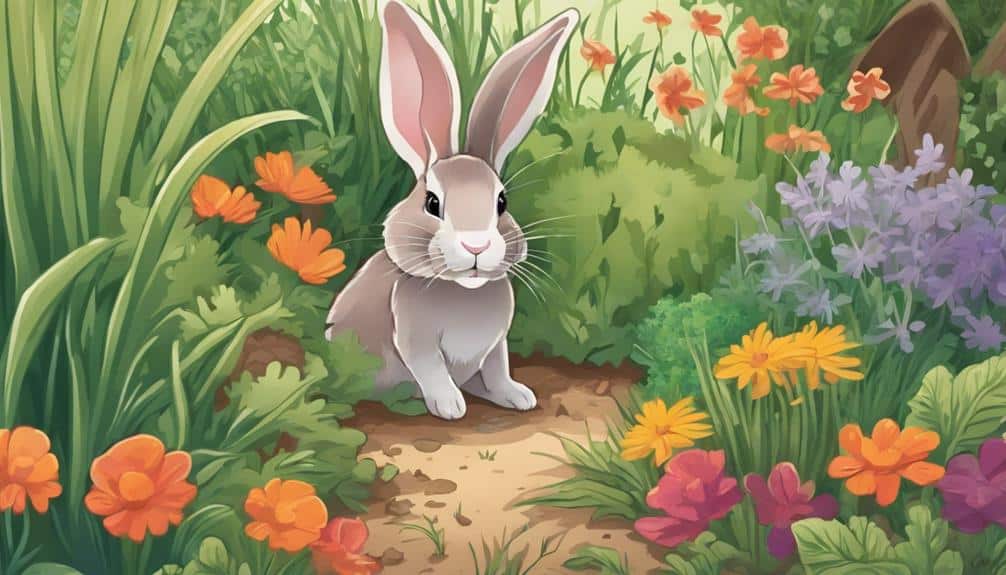
Consider incorporating a variety of non-toxic plants like hardy geraniums, roses, lavender, and nepetas in your bunny garden to create a safe and enriching habitat for your furry companions.
To enhance your bunny garden landscape, mix in herbs such as thyme and oregano, providing both variety and essential nutrition for your bunnies.
For late summer vibrancy, introduce Achillea, echinacea, and sunflowers, adding bursts of color and visual appeal.
In sunny areas, plant sunflowers and hollyhocks along borders to create a welcoming environment that captivates both you and your rabbits.
Opt for plants like these that can endure constant nibbling, ensuring a sustainable and secure habitat for your bunnies.
Frequently Asked Questions
What Is the Best Plant for Rabbits?
For rabbits, the best plants are those that provide a mix of indoor options, outdoor choices, non-toxic varieties, edible greens, easy maintenance, climbing vines, and shade providers. Diversifying plant types guarantees a well-rounded habitat.
What Is a Very Good Rabbit Habitat?
In creating a very good rabbit habitat, consider burrow construction, foraging opportunities, shelter options, natural camouflage, environmental enrichment, digging behavior, and predator evasion. Providing these elements guarantees a safe and enriching environment for your pet rabbits to thrive.
What Landscape Plants Do Rabbits Eat?
Rabbits have diverse grazing preferences, favoring certain garden favorites like roses, daisies, and sunflowers. These top choices align with their foraging habits, making these vegetation choices ideal for landscaping options and grazing selections in bunny habitats.
How Do You Make a Natural Rabbit Habitat?
To create a natural rabbit habitat, focus on natural burrow construction, wild foraging areas, safe hideaways, organic bedding options, native vegetation selection, bunny-friendly landscaping, and environmental enrichment. These elements will provide a stimulating and safe environment for your rabbits.
Are the Same Plants Suitable for Indoor and Outdoor Bunny Habitats?
Yes, the same plants can be suitable for indoor and outdoor bunny habitats. When selecting foliage for bunny enclosures, focus on safe, rabbit-friendly options like parsley, cilantro, and basil. These plants make the best habitats for bunnies to munch on and provide enrichment in both indoor and outdoor environments.
Conclusion
To sum up, the perfect plants for bunny habitats are like a nutritious buffet, offering a variety of flavors and health benefits for our furry friends.
By incorporating bunny-friendly herb plants, leafy greens, and colorful flowers into their habitat, we can guarantee that our rabbits have a well-rounded diet and enriching environment.
Remember to provide a safe and diverse selection of plants in your bunny garden to promote their health and happiness.

